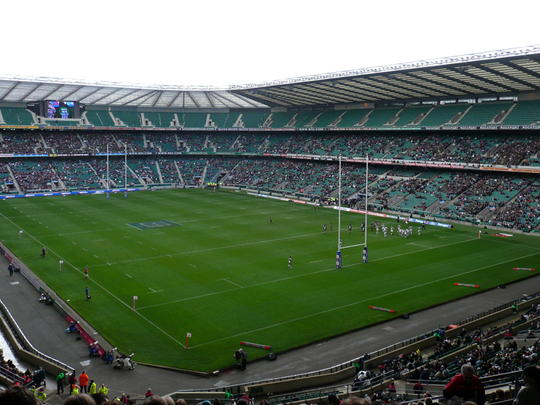
A total of 13 stadiums across England (including one in Wales) will host this years’ Rugby World Cup.
Brighton Community Stadium
Capacity 30,750 Location Falmer, Brighton Opened 2011
Profile The stadium is the home to Brighton & Hove Albion Football Club, and is one of the newest stadiums in England. Built at a cost of £93 million, the stadium features padded seats and excellent viewing.
Fixtures Pool B – September 19, South Africa v Japan; September 20, Samoa v USA
Elland Road
Capacity 37, 914 Location Leeds Opened 1897
Profile Elland Road is the home ground of Leeds United Football Club. However, despite the ground being made a famous footballing fortress by the likes of Billy Bremner, Norman Hunter and Johnny Giles in the 1960s and 1970s, the ground was originally built for rugby. The original occupants were Rugby League side, Holbeck Rugby Club. Leeds United moved in after forming in 1919.
The ground has been renovated and improved several times.
Fixtures Pool D – September 26, Italy v Canada; September 27, Scotland v USA
Kingsholm Stadium
Capacity 16,500 Location Gloucester Opened 1891
Profile The Kingsholm Stadium may boast one of the smaller capacities in the World Cup’s stadium list, but size isn’t everything. Home to Aviva Premiership side, Gloucester Rugby, Kingsholm is often touted as the “nosiest stadium in rugby”.
The ground held its first international match back in 1900, when Wales beat England 13-3. It also hosted a match in the 1991 Rugby World Cup, which saw New Zealand hammer the USA 46-6.
Fixtures Pool B – September 23, Scotland v Japan; October 11, USA v Japan. Pool C – September 19, Tonga v Georgia; September 25, Argentina v Georgia
Leicester City Stadium
Capacity 32,312 Location Leicester Opened 2002
Profile Leicester City Stadium is the home of Leicester City Football Club, and was built brand-new for the club in 2002. In the mid-2000s it was planned that the Leicester Tigers, one of England’s best Rugby Union sides, may move in to share with the football club. This idea was eventually abandoned.
The Tigers have played six games at the ground since 2005, which included the 73-3 thumping of Bristol in the Guinness Premiership.
Fixtures Pool C – October 4, Argentina v Tonga, October 11, Argentina v Namibia. Pool D – October 6, Canada v Romania
City of Manchester Stadium
Capacity 55,097 Location Manchester Opened 2003
Profile The City of Manchester Stadium was in built to host the 2002 Commonwealth Games as part of the Sport City development in Greater Manchester. However, there were concerns that the stadium would become a white elephant, which eventually led to nearby Manchester City moving in.
The stadium underwent conversion to accommodate football, with City moving in during the summer of 2003. Since that time, Abu Dhabi’s Shaikh Mansour has bought the club, and renamed the stadium as the “Etihad Stadium”, and recently increased the capacity to over 55,000.
Fixtures Pool A – October 10, England v Uruguay
Millennium Stadium
Capacity 74,154 Location Cardiff, Wales Opened 1999
Profile The Millennium Stadium is the national stadium of Wales, and is home to both the Welsh international rugby and football teams. It is the second largest ground in the world to have a fully retractable roof. The total cost of the ground to build was £121 million.
The Rugby World Cup is no stranger to the Millennium Stadium, with several matches being played there when Wales hosted the tournament in 1999, including the final.
Fixtures Pool D – September 20, Ireland v Canada. Pool A - September 20, Wales v Uruguay; September 23, Australia v Fiji; October 1, Wales v Fiji. Quarter Final 1, Quarter Final 3.
Olympic Stadium
Capacity 54,000 Location Stratford, East London Opened 2012
Profile The London Olympic Stadium needs no introduction. As the feature setting for the 2012 Olympic Games, the stadium is no stranger the global spotlight. The stadium has had to undergo a conversion process to ensure that it meets rugby standards.
The only drawback is that, thanks to the running track, the pitch is quite far away from the stands – in relative terms – which means visibility won’t be as good, and the atmosphere not quite so intimate.
Fixtures Pool B – October 7, South Africa v USA. Pool C – September 24, New Zealand v Namibia. Pool D – September 23, France v Romania; October 24, Ireland v Italy. October 30, Bronze Final
Sandy Park
Capacity 12,500 Location Exeter, Devon Opened 2006
Profile Sandy Park is home to Aviva Premiership Rugby Union side, Exeter Chiefs. The Chiefs moved into their new stadium in 2006, with a reduced capacity. It was agreed that the ground would be expanded in phases, with first phase expanding the capacity to current 12,500.
It will be the smallest ground used for the Rugby World Cup.
Fixtures Pool C - September 29, Tonga v Namibia; October 7, Namibia v Georgia. Pool D – October 11, Italy v Romania
St. James’ Park
Capacity 52,409 Location Newcastle-upon-Tyne Opened 1892
Profile St. James’ Park is the home of Newcastle United Football Club, and has been since the ground opened in 1892. The ground is layered in history, with frequent attempts to expand meeting at odds with local residents and presiding councils. This is evident when one looks at differing size – and age – stands around the ground.
The stadium hasn’t seen much rugby played at it over the years, but for the world cup it will host three group-stage matches.
Fixtures Pool B – October 3, South Africa v Scotland; October 10, Samoa v Scotland. Pool C – New Zealand v Tonga
Stadium:MK
Capacity 30,717 Location Denbigh, Milton Keynes Opened 2007
Profile Few stadiums have been the centre of such controversy before they have even been built. As part of an urban development plan, plans for a retail park on the outskirts of Milton Keynes were given the green light on the premise that a sports stadium would be built too. Without a team to fill it, the consortium behind the build poached Wimbledon Football Club, moving them 60 miles from their ground-share arrangement in their native South London.
Although the ground is unpopular in football, it has served as a useful stadium for rugby matches, and will host three World Cup matches.
Fixtures Pool A – October 6, Fiji v Uruguay. Pool B – October 3, Samoa v Japan. Pool D – October 1, France v Canada.
Twickenham Stadium
Capacity 81,605 Location Twickenham, West London Opened 1909
Profile Twickenham Stadium is the home of English rugby. The stadium is the biggest dedicated rugby stadium in the world, and has hosted some of the greatest matches in history. Twickenham oozes rugby-mania, and there is little about the stadium that feels wrong.
The ground will be the location for the opening ceremony and first match, between England and Fiji, as well as being the venue to host the final.
It was expanded in 2006 to its current capacity and is in no danger of being surpassed.
Fixtures Pool A – September 18, England v Fiji; September 26, England v Wales; October 3, England v Australia; October 10, Australia v Wales. Pool D – September 19, France v Italy. Quarter Final 1, Quarter Final 4, Semi Final 1, Semi Final 2, Final.
Villa Park
Capacity 42,785 Location Witton, Birmingham Opened 1897
Profile Villa Park is the home of Aston Villa Football Club, and has been since it opened in 1897. Few grounds are steeped in as much history as Villa Park, with countless important matches having been played there over the years.
Rugby Union has made several appearances at the ground, but this years’ World Cup will be the biggest tournament to grace the claret and blue stands.
Fixtures Pool A – September 27, Australia v Uruguay. Pool B – September 26, South Africa v Samoa
Wembley Stadium
Capacity 90,000 Location Wembley, North-West London Opened 2007
Profile Wembley Stadium is the largest stadium in the United Kingdom and the second largest in Europe. Home of the England national football team, Wembley is no stranger to hosting massive international events.
Aviva Premiership side Saracens have used Wembley on several occasions, with their 2015 match against Harlequins getting an attendance of 84,065, the largest ever attendance at a Rugby Union match.
Fixtures Pool C – September 20, New Zealand v Argentina. Pool D – September 27, Ireland v Romania








